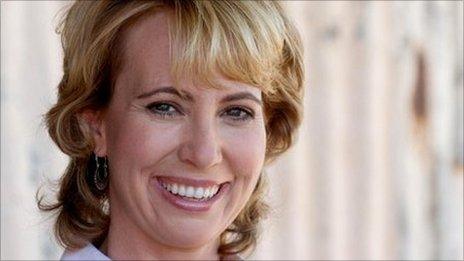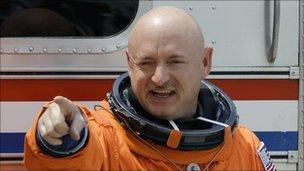Gabrielle Giffords: Another milestone in recovery
- Published

Giffords watched the shuttle take-off, commanded by husband Mark Kelly
The final launch of space shuttle Endeavour marked a milestone in the rehabilitation of Gabrielle Giffords, the congresswoman shot in the head in January, who watched in Florida as her astronaut husband commanded the shuttle.
Since January, the Arizona Democrat has been recuperating from a bullet wound to the head, sustained during a brutal assassination attempt near a grocery store in Tucson that killed six.
The nation has watched Ms Giffords' recovery closely, noting each milestone on her path back to health.
The very fact her medical team allowed her attendance at the delayed shuttle launch indicates the huge steps she has taken since a bullet travelled right through her and she was given a slim chance of survival.
Just over four months later, the 41-year-old is said to be walking unaided, forming sentences and even playing Scrabble, but movement on her right side remains limited.
The bullet wound was to her brain's left hemisphere, which controls speech and movement for the right side of the body.
Seeing the launch was her personal goal and showed her "remarkable" progress, said doctors at TIRR Memorial Herrmann rehabilitation centre in Houston, Texas.
Speaking to the Arizona Republic, external, Dr Dong Kim, a neurosurgeon working with Ms Giffords, said her progress is "maybe in the top 1% of patients in terms of how far she's come, and how quickly she's gotten there".
Dr Kim remembers her condition on the day she was shot, when doctors were not sure she would survive. Indeed, false media reports circulated on that day that she had died.
"For somebody with that kind of injury, we start with, 'Are they even going to come out of the coma?'" Dr Kim said.
Statistically, only about 5% of people with similar injuries live.
Not only did Ms Giffords pull through but she began talking about a month after the shooting, and is now speaking in short sentences, saying things like "I love you", and "thank you".
According to her doctors it is difficult for her to form longer, spontaneous sentences.
'Ready to work'
With serious brain injuries like hers, physical and speech recovery usually happen within nine to 12 months, says Dr Kim, but progress with regards to judgement and how well a patient can think can continue for years.
Ms Giffords' husband Mark Kelly, Endeavour commander, has taken his wife's wedding ring into space with him, to give to her again when he returns.
Speaking to CBS News, he said the congresswoman was anxious to get back to work.
"She wants to get back to Tucson, back to her district, [she] wants to get back to Washington," he said.

Mark Kelly commands the Endeavour space shuttle's final launch
Her medical team has been optimistic about the possibility of her returning to public office, but says there is no definitive schedule at this point.
That has not stopped some people talking about her possibly running for the Senate, so strong has been the outpouring of sympathy for her.
There has even been polling to assess how well she might do in a hypothetical Arizona Senate race, with one by Public Policy Polling suggesting, external her popularity would be sky high with voters of all persuasions.
But she still has a long way to go before that can happen.
While optimistic about his wife's recovery, Mr Kelly is also realistic about her condition.
"You know, it's difficult for her to walk," Mr Kelly told the Arizona Republic. "The communication skills are difficult, at this point."
There have been no pictures released of Ms Giffords since the shooting, but reports says a scar is visible through her blonde hair, which she is now wearing short.
She is scheduled to receive a cranial implant later this month to repair a section of her skull.
The doctors treating Ms Giffords have tried to temper their upbeat progress reports, saying that recovery from a grave injury like the one she suffered must be understood in relative terms.
"If somebody has a severe brain injury, are they ever going to be like they were before? The answer is no. They are never going to be the exact same person," said Dr Kim.
Ms Giffords watched the launch, originally planned for 29 April but postponed due to technical problems, from a restricted area alongside other family members of the flight team.
- Published2 August 2011
- Published9 January 2011